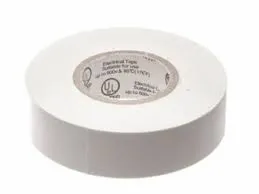A Comprehensive Guide to Insulation Tape Types
Insulation tape is an essential tool used in a variety of applications across different sectors, including electrical, automotive, and home improvement. Its primary purpose is to insulate electrical wires and components, ensuring safety and reliability. However, not all insulation tapes are created equal; they vary by type, material, and application. In this article, we will explore the different types of insulation tapes, their characteristics, and common uses.
1. Vinyl Electrical Tape
Vinyl electrical tape is one of the most commonly used types of insulation tape. Made from polyvinyl chloride (PVC), this tape is flexible, durable, and resistant to moisture and UV rays. Vinyl tape is available in various colors, making it easy to use for color-coding wire circuits. Its temperature range typically runs from -10°C to 80°C (14°F to 176°F), making it suitable for various indoor and outdoor applications. Electricians often use it for insulating wires, wrapping electrical connections, and providing a protective layer over exposed wire.
2. Rubber Electrical Tape
Rubber electrical tape is designed for high-voltage applications and provides superior insulation. It is made from a rubber-based backing that maintains its elasticity and conductivity over a wide temperature range. This type of tape is particularly useful for splicing wires and should be wrapped tightly to ensure a solid seal. Rubber tape often has a temperature rating of up to 105°C (221°F), making it suitable for high-heat environments. Additionally, its inherent adhesive properties allow for excellent bonding even in adverse conditions.
Cloth electrical tape, also known as gaffer's tape, combines durability and flexibility. Typically made with a cloth backing and a rubber adhesive, this tape is often used in theatrical and entertainment applications to secure cables and wires on stage. Its texture allows it to grip surfaces effectively, and it can be torn by hand, making it convenient for quick fixes. While it provides decent insulation, it is not as moisture-resistant as vinyl or rubber tapes. Therefore, it is best used in dry environments.
insulation tape types

4. Heat-Resistant Electrical Tape
Heat-resistant electrical tape is designed for applications where high temperatures are a concern. This type of tape is typically made from a combination of silicone or polyester materials. It can withstand temperatures exceeding 200°C (392°F) without losing its insulating properties. This tape is commonly used in automotive and aerospace industries, as it provides reliable insulation in environments prone to extreme heat.
5. Self-Fusing Silicone Tape
Self-fusing silicone tape is unique in that it does not contain adhesive. Instead, it bonds to itself when stretched and wrapped tightly around a surface. This type of tape can be used in a variety of applications, including sealing joints and protecting wiring from moisture and corrosion. It can handle temperatures up to 260°C (500°F) and is often used in automotive and marine applications, where exposure to water is prevalent. Its self-fusing properties make it ideal for creating a waterproof seal around electrical connections.
6. Foil Tape
Foil tape is another specialized type of insulation tape. Typically made from aluminum foil, it offers excellent thermal and light reflectivity. Foil tape is often used for duct sealing and insulation, providing a protective barrier against moisture and air leaks. Its strong adhesive properties allow it to stick to a variety of surfaces, including metal and plastic. Although it is not commonly used for electrical applications, it can provide some insulation when used in combinations with other materials.
Conclusion
Understanding the various types of insulation tape is crucial for selecting the correct one for your specific needs. From vinyl electrical tape for general wiring tasks to high-temperature self-fusing silicone tape for extreme conditions, choosing the right tape can ensure safety and effectiveness in your projects. Always consider the environment, temperature, and material compatibility before making your choice to ensure optimal performance. By selecting the appropriate insulation tape, you can protect not only your electrical systems but also enhance the longevity of your projects.
-
XIANGFAN Rubber Tape-Ultimate Solutions for All Your Insulation NeedsNewsJun.24,2025
-
XIANGFAN Rubber Tape-Protection for Industrial and Residential ApplicationsNewsJun.24,2025
-
XIANGFAN Rubber Tape: Superior Safety and Sealing for Demanding EnvironmentsNewsJun.24,2025
-
XIANGFAN Rubber Tape: Reliable Solutions for Every Electrical ChallengeNewsJun.24,2025
-
XIANGFAN Electrical & Industrial Tape: Powering Reliability Across IndustriesNewsJun.24,2025
-
XIANGFAN Electrical & Industrial Tape: Excellence in Every ApplicationNewsJun.24,2025
